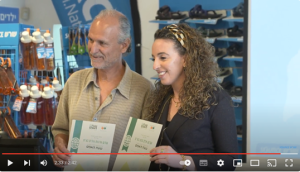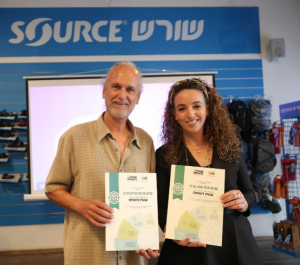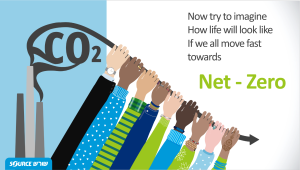Source Vagabond Systems (SVS) – Carbon Reduction Plan and Initiatives
Background:
SVS is a pioneer and market leader in the quest to reduce Greenhouse Gas Emissions (GHG) and reach Net-Zero, in line with what is needed to keep global heating below catastrophic levels.
On 29 March 2023, SVS joined “Zero Hour” – the Israel Net Zero Platform launched during COP 27 by the Israeli Ministry of Environmental Protection (MoEP). The Zero Hour platform is a professional Israeli infrastructure for determining targets for reducing greenhouse gas emissions to reach a total reset – Net Zero goal by 2050.
On 29/3/2023 SVS was the first Israeli industrial company to join the platform as seen on the MoEP Gov.il Zero Hour web page https://www.gov.il/en/pages/zero-hour.
The Israeli Minister of Environmental Protection granted the certificate when visiting the SVS Tirat Carmel facility in May 2023.
SVS Ongoing Carbon Reduction Initiatives:
During 2018 – 2022 Four Carbon reduction Initiatives were launched in SVS Tirat Carmel premises:
- Examining the feasibility of disconnecting a midsize production plant from the national electricity grid using renewable energy, energy storage and energy management Systems (“Microgrid”) –
Pioneering demonstration project 50% sponsored by the Chief Scientist of the Israeli Ministry of Energy.
following this project, starting September 2022, SVS sandal factory which takes 1/3 of the company’s electricity consumption, is working 365 days a year based on sun energy only. With zero carbon emissions, zero air pollution, and zero electric bill. Ling to a short video describing the project: https://www.youtube.com/watch?v=NSPQ10iynD8 - Electrifying Company Vehicle fleet –
All the company combustion engine vehicles (total of 15) were replaced with electric vehicles. A BOD resolution stated that any new company vehicle will only be electric without any exception. Charging stations were installed in SVS premises with the energy management system charging the company cars using the Microgrid system. - Developing and installing a gasification system to produce energy from non-recyclable company industrial waste-
Another pioneering demonstration project is 50% sponsored by the Chief Scientist of the Israeli Ministry of Energy.
It’s a small-scale 50Kw/h gasifier to be installed in SVS operating area. The gasifier will turn annually 150 tons of non-recycle plastic waste (that now goes to landfill) into electricity. The Gasifier will operate as a renewable energy source during the 6 months of the winter (when the PV system on the company roofs produces only 38% of the annual renewable energy) to balance the self-consumption energy needs of SVS. In this project, we use plastic waste as a battery to store energy between the summer and winter seasons. The ration of the gasifier feedstock is 70% plastic waste and 30% biomass. This ratio is a world record. Nothing like this has been done before in the waste-to-energy field. 1 Kg of plastic/biomass feedstock will generate 2 Kw/h of clean renewable electricity. - VIRTUS Soft Armor Filler (SAF) inserts saved from landfill-
Since January 2015 SVS is the prime contractor of the VIRTUS program. Hundreds of thousands of anti-frag SAF ballistic protection inserts have been delivered to the British Army so far. SAF inserts are made of layers of Para-Aramid fabric material. In the cutting of the SAF fabrics to shape (for ballistic coverage and fit) we have about 15% of waste that traditionally goes to landfill. Since the beginning of the VIRTUS program, SVS has initiated a circular economy program using the SAF fabric waste to make Fire Retardant gloves and accessories. So far SVS circulated about 70 tons of SAF fabric waist and by that reduced our carbon footprint by 94,500 Kg of CO2e.
Since the above carbon reduction program initiation we have been trying to convince the UK MOD to save the VIRTUS SAF inserts from landfill by granting SVS as VIRTUS prime the task of taking care of the SAF inserts when they reach their end of life (10 years of use). So far with no success.
Currently, the UK authority is in charge of collecting and disposing to landfill all the issued SAF inserts at their end of life. This represent at the least a carbon footprint on UK ground of 700,000 Kg of CO2e.
We highly recommend adding to the VIRTUS re-compete tender requirements a clause that puts the products end-of-life responsibility in the hands of the prime contractor as part of his Carbon reduction planning.
SVS Emission Reduction Targets to Net Zero:
Based on the above four Carbon Reduction initiatives, SVS BOD approved end 2022 a carbon reduction investment plan and set the following ambitious GHG Emission reduction targets for the company:
- Net Zero Scope 1 & 2 by end of 2025
- Net Zero Scope 3 by end of 2030
- Baseline Year – 2021.
SVS Carbon Reduction Plan:
As part of the Zero Hour platform, SVS will be reporting its GHG emissions to the Israeli MoEP. The reports to be submitted by the end of 2024 are for the baseline year (2021) and for the year SVS joined the Zero Hour platform (2023). Until the end of 2025, the reports will cover only scope 1 and 2.
The reporting validation process is to be managed by the Standards Institution of Israel (SII). The validation body must be an institute accredited to ISO 14065 or ISO 14064-3. At the moment SII is not accredited to ISO 14065 so we are considering signing up to SBTi to house the SVS target validation services. https://sciencebasedtargets.org/
SVS Baseline Emissions Footprint Scope 1 & 2:
Emissions as a result of consuming electricity:
SVS only uses electricity as a source of energy in our Tirat Carmel premises. Our annual electricity consumption in 2021 (baseline year) was 831,336 Kw/h. According to the Israel Electric Corporation (IEC) 0.64 Kg/CO2 is emitted for every 1 Kw/h generated. The average SVS cost for 1 Kw/h is NIS 0.54 (GBP 0.108).
Annual SVS emissions as a result of electricity consumption is 532,055 Kg/CO2 and the direct cost involved is GBP 89,784.
Emissions as a result of driving company vehicles:
In 2021 (baseline year) SVS vehicle fleet drove 475,000 Km and consumed about 29,687 liters of gasoline. 1 liter of gasoline used in the combustion engine of a standard car emits 2.4 Kg/CO2. Such a standard car will emit 0.15 Kg/CO2 for every 1 Km drive. The average SVS cost for 1 liter of gasoline is NIS 7.0 (GBP 1.4). Annual SVS emissions as a result of driving company vehicles is 71,250 Kg/CO2 and the direct cost involved is GBP 41,562
Emissions as a result of landfill disposal of industrial plastic waste:
SVS is promoting now for several years a program encouraging our employees to separate waste at source and recycle it. In the baseline year, we got to the point that 95% of our dry recycle waste (paper, pallets, cardboard, plastic films injected parts, etc. is separated at Source and does not go to landfill. However, we still remain with 100 tons of non-recyclable industrial waste including rubber, fabrics, foams, webbings, coextruded and laminated plastic films, etc. that goes to landfill in the form of municipal waste. The gasifier waste-to-energy initiative aims to bring our landfill disposal to zero.
Our annual industrial waste disposal in 2021 (baseline year) was 100,000 Kg. According to the Israeli MoEP 1 Kg of municipal waste that goes to landfills discharge methane gas to the atmosphere equal to 1.35 Kg of CO2 emissions. The average SVS cost for disposing of 1 Kg of waste is NIS 3.5 (GBP 0.7).
Annual SVS emissions as a result of landfill disposal of industrial plastic waste is 135,000 Kg/CO2 and the direct cost involved is GBP 70,000
In TOTAL, SVS annual scope 1&2 greenhouse emissions in the baseline year due to electricity consumption, driving company vehicles and landfill disposal are 735,305 Kg/CO2 and the company cost involved is GBP 201,346.
SVS Baseline Emissions Footprint in the UK:
Scope 1:
0 tCO2e. There is no scope 1 SVS Emissions Footprint in the UK.
Scope 2:
0 tCO2e. There is no scope 2 SVS Emissions Footprint in the UK.
Scope 3:
Scope 3 emissions attributed to Source’s activity in the UK include the logistics concerned with the supply according to the current Virtus contract. Measuring of such emissions has not been done yet, but it is roughly estimated at 15 tCO2e, based on the assumption that involved logistics require 50 trucks per year, each traveling 200km and emit 1-1.5 kg CO2e per km traveled.




